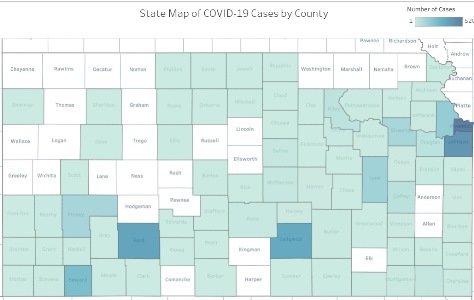
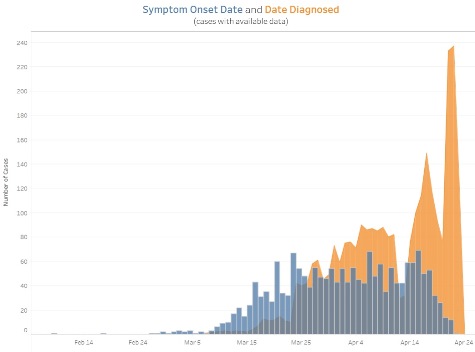
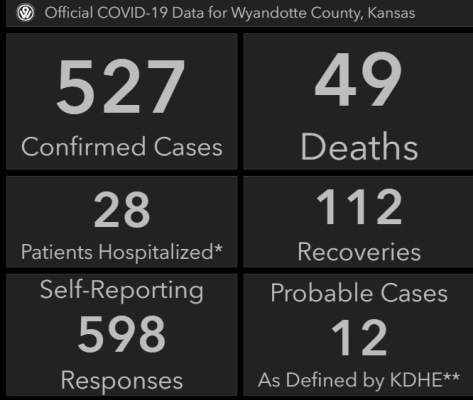

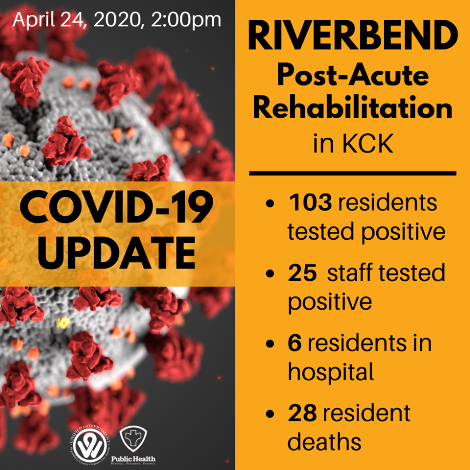
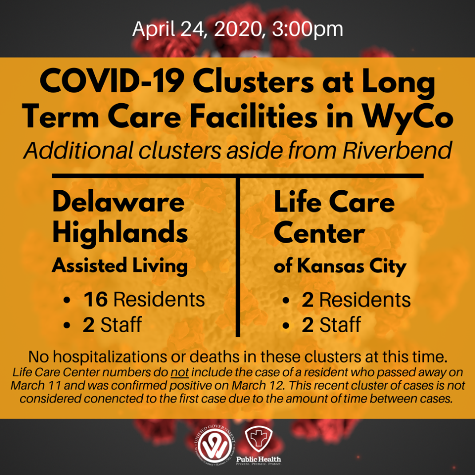
Kansas saw its highest increase of positive COVID-19 cases on Friday, increasing 295 for a total of 2,777, according to Gov. Laura Kelly.
COVID-19 cases now are in 76 of the 105 Kansas counties, according to state health statistics. There was a reduction from 112 deaths on Thursday to 111 deaths on Friday because someone was misdiagnosed, according to officials.
Wyandotte County reported 527 cases and 49 deaths at 4:10 p.m. Friday, according to the Unified Government COVID-19 website. That included two more deaths than Thursday evening. There were 490 cases on Thursday evening, for an increase of 37 more cases in Wyandotte County.
The number of deaths at the Riverbend Post-Acute Rehabilitation facility at 78th and Freeman in Kansas City, Kansas, is now up to 28, the UG Health Department reported today. The number of residents testing positive for COVID-19 has increased to 103, the Health Department reported. All the residents were tested previously, with a small number who were negative, and a retest showed some of the residents who were formerly negative were now positive, the Health Department stated. Those who tested negative were assigned to a separate floor, according to the Health Department.
The UG Health Department also reported today two more nursing homes in Wyandotte County have clusters of cases. Delaware Highlands Assisted Living, 12600 Delaware Parkway, Kansas City, Kansas, has 16 residents and two staff members who tested positive, according to the Health Department. The Life Care Center of Kansas City, 3231 N. 61st, Kansas City, Kansas, had two residents and two staff members who tested positive, the Health Department stated.
There were no hospitalizations or deaths in these clusters at this time, according to the report.
The Life Care Center numbers did not include the case of a resident who died March 11 and was confirmed positive on March 12, the first death related to COVID-19 in Wyandotte County. The recent cluster of cases was not considered connected to the first case because of the amount of time between cases, the Health Department stated.
“We feel optimistic that Kansas is close to reaching its peak,” Gov. Kelly said in a news conference today, “if we haven’t already.”
If so, they are heading to a downward slope and should be able to proceed with plans for recovery, which they will be announcing next week, she said.
Gov. Kelly said three plans would move ahead at once. First, the state will make sure it is developing a plan to disburse federal dollars into the Kansas economy as quickly as possible, she said.
Also, the state will announce guidance on reopening the Kansas economy in phases, she said.
Third, the state must identify a strategy to manage cash flow and address an imminent budget crisis, she said. On Monday, the state heard a report that it was a $1.27 billion shortfall, and Gov. Kelly has been working on it with the budget director this week.
“The slowdown in the economy brought on by the spread of COVID-19 has caused our state’s budget situation to deteriorate rapidly,” Gov. Kelly said.
If the state wants to protect all the progress it has made in recent years in the schools, the correction systems, and the infrastructure, then Kansas will need help to get it through this, she said.
Federal aid approved by Congress on Thursday will inject more money into the economy for small businesses, economic disaster loans and grants, she said. It also provides aid for hospitals that have scaled back while investing more money in fighting COVID-19, she said.
The federal package also boosts funding for expanded testing capacity, she said. This will be crucial for determining when it will be safe for Kansas to reopen, she said.
Gov. Kelly also said there is need for additional funding in direct, flexible state aid.
“I am gravely concerned that Kansas is prohibited from using CARES Act funds to replace general fund revenue,” she said. She added there was a need for local government funding as well.
“If the federal government fails to act, we will be forced to make very deep cuts to critical services,” Gov. Kelly said.
She said there is a key difference between the $1 billion cuts Kansas made during the Great Recession and the over $1 billion shortfall Kansas faces today. The Great Recession cuts, while brutal, occurred gradually, she said, and communities had a chance to adapt and prioritize to limit the damage as much as possible. Without aid from the federal government, the state will be forced to make all the cuts in just one budget cycle, she said.
Gov. Kelly said she was alarmed and frustrated at statements at the federal level that the states should just file for bankruptcy. “I don’t even know what that means,” she said.
From her first week in office, she has said it wasn’t a matter of if the state would face a downturn, but when and how bad, she said.
“But no one, not even the federal government, anticipated a downturn of this scale and this speed,” Gov. Kelly said.
Today, Gov. Kelly sent a letter to the federal delegation about the severity of the state’s situation, and requested support of a relief package that includes flexible, direct state aid, she said.
“Our ability to recover from this public health pandemic and revive our state economy hinges upon the state’s ability to pay its bills,” she said. “Kansas communities rightfully expect state government to fund public education, they expect a strong public health system, public safety, a safety net for seniors and an adequate technology infrastructure to insure that public resources will be accessed in a timely manner. Without flexible federal aid, Kansas will find itself unable to fulfill these obligations when they are needed most.”
Dr. Lee Norman, Kansas health secretary, said the state is monitoring 52 clusters.
They include 19 in long-term care facilities, with 377 cases and 63 deaths; two group living arrangements, 28 cases and no deaths; correctional facilities, Lansing Correctional Facility, 82 cases and no deaths; two in health care facilities, with 16 cases and no deaths; five religious gatherings, 88 cases and eight deaths; and 17 in private companies, 99 cases and four deaths.
The one thing the companies have in common is people were close to each other, Dr. Norman said.
Accounting for a recent uptick in cases recently are six meatpacking plants, with 250 cases and no deaths, he said.
CDC staff have landed in Kansas and have started attending incident command meetings, he said. Three of the staff are located in southwest Kansas, working directly with the meatpacking plants. Four staff members are in Topeka working with epidemiologists and the team, he said.
The state lab now has received its first shipment of 3D printed swabs, and now testing can go forward, They are now shifting from just testing ill people, to testing the general population, he said. They will try to get to five tests per thousand in population to understand the prevalence of the disease. Some counties already are at that level, he said.
Dr. Norman said there is marked improvement in hospitalization and death numbers in Kansas. Although more time is needed to be certain, the trend line is favorable, he said.
He said he believes the state has reached its peak in hospitalizations and deaths, however, the total number of cases could continue to go up.
The state may continue to have more positive tests and more positive in tests per capita, he said, because of increased testing capacity. That is a good thing because they will know where the disease is and can go out to those areas and stop the spread of the disease.
He said they may see a lower percentage of positives. Dr. Norman said people in Ford County, the Dodge City area, have been remarkably symptom free or with mild symptoms. They need to continue public health messaging and monitoring of where they are in their communities as they interact with their families and communities.
Other counties’ reports, according to the KDHE: Johnson County, 417 cases; Ford (Dodge City area), 350 cases; Sedgwick (Wichita area), 323 cases; Seward (Liberal area), 232 cases; Leavenworth County, 154 cases; Lyon County (Emporia area), 126 cases; Finney (Garden City area), 107 cases; Shawnee (Topeka area), 99 cases; Coffey (Burlington area), 48 cases; Douglas (Lawrence area), 46 cases; and Riley County (Manhattan area), 40 cases.
To see the governor’s news conference, visit https://www.facebook.com/GovLauraKelly/videos/2345585855750206/.
The Kansas COVID-19 resource page is at https://govstatus.egov.com/coronavirus.
The UG’s COVID-19 webpage is at https://alpha.wycokck.org/Coronavirus-COVID-19-Information.
Information from the CDC is at https://www.cdc.gov/coronavirus/2019-nCoV/.
